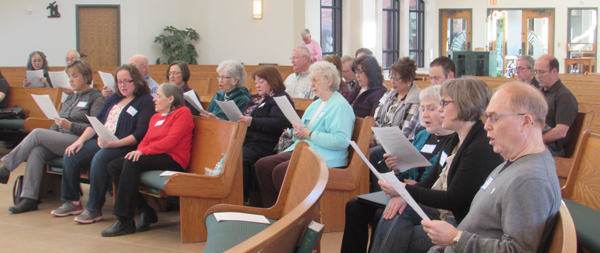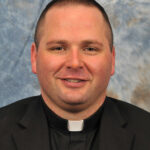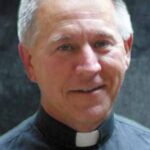By Barb Arland-Fye
The Catholic Messenger
During Sacred Heart Cathedral’s “under construction” status, exposure to the diocesan choir grew as diocesan Masses were celebrated in other parishes. The exposure piqued interest in participating in the diocesan choir.

Catholics involved in music ministry sing during a workshop Jan. 27 at St. Alphonsus Parish in Mount Pleasant.
“As I talked to people, they expressed an interest in having these workshops and finding out how they could be involved as a cantor, a director, an accompanist or choir member,” said Kay Temple, who coordinates the diocesan choir. “People didn’t even know the diocesan choir existed.”
In response to requests, two identical music workshops were organized to explore the role of music ministry in the liturgy, the distinction between being a music minister and a musician and the spirituality of serving in music ministry. The first workshop was held Jan. 27 at St. Alphonsus Parish in Mount Pleasant. The second will be held Feb. 11 at St. Joseph Parish in DeWitt from 1-4 p.m. Directors, instrumentalists, cantors and choir members are invited to attend the workshop.
David Pitt, associate professor of liturgical and sacramental theology at Loras College in Dubuque, Iowa, is the workshop presenter. Some people are familiar with Pitt because he directed the choir for the diocesan Mass during which nine men were ordained permanent deacons last summer at St. John Vianney Catholic Church in Bettendorf, Temple said.
Each presentation begins with an exploration of the spirituality of music ministry: the functions of liturgical music, participation in the liturgy, and liturgical music ministry. Pitt cites the Vatican II document, Sacrosanctum Concilium, which states that “The musical formation of the assembly must be a continuing concern in order to foster full, conscious active participation.”
Pitt also reviews the roles of, and skills needed to be, a choir director and cantor. Directing the participants, he demonstrates how an individual might approach directing a choir in singing hymns, psalms, and the parts of the Mass. Cantors will have the opportunity to practice their skills individually and receive feedback.
Response to the first workshop in Mount Pleasant was very positive, Temple said. Participants traveled from Fairfield, Burlington, Washington and Dodgeville to attend. Meg Earsley of St. Mary Parish in Fairfield wrote in an email to Temple: “Thank you so much for bringing this opportunity to SE Iowa! I look forward to seeing if I can make some of the diocesan choir rehearsals and Masses…. The workshop was very interesting and left many of our attendees with lots of ideas.”
Earsley leads her parish’s small Schola and adds her voice as an alto. She most appreciated the workshop’s “focus on the purpose of music ministry as encouraging the congregation to participate in every way possible (in full participation, both internal and external). The ideas and best practices that were presented were centered on concrete and practical ways to accomplish this with the parish. I know I came away with a host of ideas specific to directing the choir, like not conducting hymns that are familiar and don’t require that kind of assistance outside of times when the choir is in need of it.”
Ciony Metz of Muscatine loved the workshop. “It was everything I believe about the role of a choir, and musicians in general — that we are there to facilitate, to encourage, to empower, to bring the congregation to truly PARTICIPATE in the liturgy,” she emailed Temple. “When the congregation just “sits back” to listen to the choir and/or cantor ‘perform,’ then we have failed in our ministry — at least, that’s what I feel was reinforced at the workshop.”











